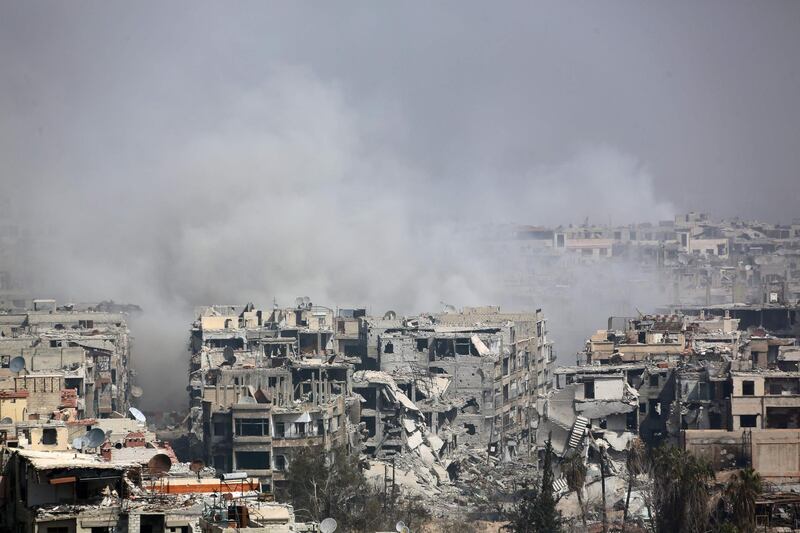One of the deadliest attacks in Damascus since the start of Syria's seven-year war killed at least 43 people on Wednesday, while fighting continued elsewhere in the country.
The mortar assault targeted a busy market on the eve of Mother's Day, witnesses told state-run TV. Eleven pro-regime fighters were reportedly among the dead.
President Bashar Al Assad's government blamed the attack on rebels in Eastern Ghouta, where Syrian troops and Russian war planes have been waging a month-long air and ground offensive, killing thousands of civilians, including children.
Videos of the aftermath posted online showed scenes of chaos, with people screaming and bodies and mannequins strewn across the ground.
Hospital director Mohammed Haitham al-Husseini told Al Ikhbariya TV that 35 were wounded, with six in intensive care. He said most of the casualties were women and children.
The attack comes just days after a lightning assault by ISIL to seize the Damascus neighbourhood of Qadam left 62 regime fighters dead.
ISIL fighters have maintained a presence in parts of Damascus, including in the Palestinian camp of Yarmuk and the neighbourhoods of Hajar Al Aswad and Tadamun.
The district is smaller than and not connected to Eastern Ghouta, where the Syrian army and allied forces have recaptured 70 per cent of the territory that was under insurgent control, causing thousands of residents to flee.
A Russian-brokered deal was reached on Wednesday to evacuate one of Ghouta's rebel groups, offering them a corridor to opposition-held northwestern Syria.
Fighters from the Ahrar Al Sham rebel group in control of the besieged town of Harasta had agreed to lay down their arms in return for safe passage to insurgent-controlled areas.
The rebels were also offered to be pardoned under local reconciliation terms, two opposition sources said.
There was however no indication when the deal would be implemented and one source familiar with the talks said obstacles may delay it.
The evacuation deals come after years of siege and bombardment - a major strategy by the Syrian army to force rebels to surrender.
"The deal has been finalised and it could come into effect soon after a ceasefire is announced as early as Wednesday," said one official familiar with the talks that have been going on for several days.
It would begin with an evacuation of injured civilians, he added, saying the remaining civilians in the town were "facing untold suffering".
A local official in the opposition-run Harasta council was quoted by opposition news outlets that a deal had been reached but did not say when it was expected to be implemented.
___________
Read more:
Russia blame for Syria air strike that killed 15 children
ISIL takes control of Damascus area after rebels pull out
___________
Last year, rebels launched a major offensive on army barracks on the edge of Harasta that led to retaliatory attacks. The battles were among the fiercest in Eastern Ghouta in recent years.
Mr Assad has vowed to end what he portrays as a terrorist threat in proximity to his seat of power.
On Tuesday, a rocket fell on a popular residential area across the rebel-held enclave killing at least 40 people, according to medics in government controlled areas.
The Syrian authorities accused rebels of firing the rockets in revenge attacks which rebels deny.
More than 100 civilians were killed in the last two days of air strikes in Eastern Ghouta with most of the raids on Douma city, the largest population centre with more than 150,000 people still living there.
Rebels and residents say napalm and incendiary weapons were dropped on several civilian areas to force rebels to surrender.
The predicament of hundreds of rebels trapped in Harasta, one of the main towns in Eastern Ghouta, worsened after the army succeeded earlier this month in splintering Ghouta into three besieged zones, cutting off Harasta from other areas.
Last Sunday, the Syrian army had given the rebels of Harasta an ultimatum to withdraw, state media said.
Residents and rescuers say the Russian air force stepped up its bombing of Harasta town as talks were going on to broker the deal.
The Harasta deal will pile pressure on the two main rebel groups — Failaq Al Rahman in the southern pocket and Jaish Al Islam in the northern enclave — to also reach understandings.
They have however publicly said they reject Russia's offer to leave the enclave.
The most likely option was however the transfer of Failaq Al Rahman and Jaish Al Islam fighters to opposition-held areas in northern and southern Syria respectively, a rebel official familiar with the situation on the ground said.
The defeat in Eastern Ghouta would mark the worst setback for the anti-Assad rebellion since the opposition was driven from eastern Aleppo in late 2016 after a similar campaign of siege, bombing, ground assaults and the promise of safe passage out.





